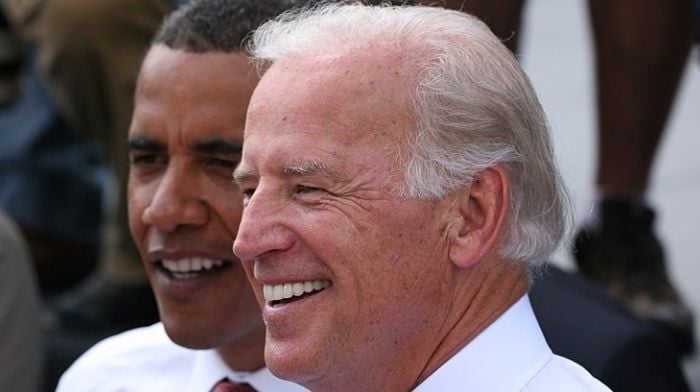
By now, most have noticed it’s that special time of the year when corporations profess solidarity to the LGBTQ+ community by wrapping themselves in a rainbow flag and wishing us “Happy Pride” in an effort to make more money. Based on the wide array of memes going across the internet, it’s nice to know that in the midst of a never-ending plague, others still find humor in the way major companies carry on in June as I do. Not that they don’t make it easy.
Like in the case of Burger King Austria, which recently unveiled a “Pride Whopper” under the goal “for equal love and equal rights,” per a translation found on BK’s website.
It’s technically the same old whopper ― a flame-grilled beef patty (or the plant-based patty as a substitute), lettuce, tomato, onions, pickles, mayo and ketchup ― but the messaging is apparently what makes it infinitely more powerful.
“We are setting an example for individuality and freedom and stand for a respectful interaction with each other,” the description on the site continues. “Equal rights. Empathy. Understanding. No matter where you come from, no matter who you love, no matter what you look like or what you believe in: Time to be proud.”
What do you get if you add bacon and cheese?
I suppose this is at least a more thoughtful corporate caption than the “Homo Estas? Very well, thank you. #LoveWins” tweet we got from Chipotle some years ago. (To be fair, that kind of fits the Chipotle vibe.) And it’s definitely warmer than the “Happy Pride! Here’s 20% off” emails I get from various entities trying to get me to buy things I probably don’t need. The same applies to all of the companies that ask gay creatives like myself to effectively give them free advertising in exchange for nothing (the answer is no, give me money).
That’s why fake deep meaning attached to the Whopper aside, to the credit of Burger King, they also donated some money to the cause ― pledging to donate 40 cents from the purchase of every Ch’King sold this month (up to a maximum donation of $250,000) to the Human Rights Campaign, the country’s largest LGBTQ advocacy group.
Not to count Burger King’s money, but it seems like they could up that figure in addition to giving their employees, many of whom are likely LGBTQ, a boost in pay. Still, I worry that under the wave of rising anti-LGBTQ laws from elected Republicans nationwide, will we end in a situation where corporations won’t even bother to acknowledge us at all, and their collective flops at celebrating the real tenets of Pride Month will fade from public memory.
After convincing enough white people that the academic and legal framework known as critical race theory was somehow escaping law schools across America and threatening to pummel white guilt into the precious minds of white kids aged K-eternity to try and win elections in 2021, Republicans have moved on to new targets: every letter in the LGBTQ+ community.
The result has been more than 300 anti-LGBTQ bills being introduced across the country, including multiple states seeking to ban transgender women and girls from competing on sports teams consistent with their gender, and in select states, the outright banning of gender-affirming care for transgender youth where in some cases it would be a felony for doctors to provide such care to minors.
There is also the passage of Florida’s “Don’t Say Gay” bill, which limits the restrictions on teaching LGBTQ topics in schools. In the lead up to its passage and signing it into law, Ron DeSantis accused his critics of supporting “sexualizing kids in kindergarten.” (Similarly, the man he models himself on politically, former President Donald Trump, jumped on the rhetoric and likened teaching kids about gender and pronouns to “child abuse.”)
More recently, Republican Texas State Representative Bryan Slaton announced he will file legislation to ban drag shows in the presence of minors. As utterly stupid as such legislation sounds, the homophobic and transphobic sentiments behind such proposals can’t be understated. And as much as queer and trans people and their supporters are being labeled as predators, it’s only Republicans proposing to inspect the genitals of female high school and college athletes.
The rhetoric has not necessarily shifted public opinion yet, as evidenced by a poll released in April by the University of Chicago Harris School of Public Policy and The Associated Press-NORC Center for Public Affairs Research, that found, overall, Americans lean slightly toward expanding discussions of sexuality in K-12 classrooms. But I take issue with political observers, who argue that it’s only a matter of time before today’s anti-LGBTQ rhetoric stops working in Republicans’ favor. They don’t appear to know how their country works.
Not all of us can afford to exist in such a bubble.
We’re presently living in a political climate where the nation is awaiting a Supreme Court with a 6-3 conservative majority to strip abortion rights for millions of women. During the confirmation hearing of Ketanji Brown Jackson, Republican senators like John Coryn of Texas questioned her about marriage equality ― suggesting that is the next target should Roe be overturned. Even before all of this started happening, anti-LGBTQ violence rose dramatically under the Trump administration.
I understand that ever since Trump found his way into the White House, there has been too much chaos to keep up with in the news cycle on a given day, but it’s hard to ignore the pattern of white Christian nationalism informing much of the GOP’s talking points then, or now.
The same applies to their rising authoritative impulse, or in the case of Ron DeSantis, who is using his power as Florida’s governor to punish people for the sake of launching a presidential bid, fascist kink. Disney did the right thing by listening to its employees and issuing a statement against DeSantis’ cruel “Don’t Say Gay” bill, but his response was to revoke the company’s special tax status. He has since repeated that method of retaliation on the Tampa Bay Rays for their support of gun safety reform.
Far be it from me to not have a lot of faith in the name of businesses that typically place profit above all, but should DeSantis find his way into the White House, it is likely he will continue this practice and use the powers of the federal government to bring corporations to heel. I don’t think most would put up that kind of fight under such pressures. Already, some are caving under the pressure of Republicans making the LGBTQ community its favorite new punching bag.
State Farm, for example, dropped its support for a program providing LGBTQ-theme children’s books to teachers and libraries after complaints from conservatives.
“This program that included books about gender identity was intended to promote inclusivity,” Victor Terry, State Farm’s chief diversity officer, reportedly wrote in an email to staff. “We will no longer support that program,” he said, adding that “conversations about gender and identity should happen at home with parents.”
The program, which would see agents and staffers distribute books to community centers, libraries and teachers, aimed to “increase representation of LGBTQ+ books and support our communities in having challenging, important and empowering conversations with children age 5+.”
Programs that benefit people like me, a gay author. It is offensive for anyone to buy into the notion that any mere mention of us points to some kind of perversion. And it really sucks for people who now need to consider getting a less intolerant car insurance company.
There are other comments from American CEOs that give other causes for concern, but ultimately, the issue is a major political party that has made a target out of one community, and not only are major media outlets ignoring it or dismissing it as a “culture war,” the other major political party seems ill-prepared to lead any type of proper push back. Meanwhile, Marjorie Taylor Greene means it when she says she wants Pride month to end to save straight people.
I don’t place my value or sense of pride in whether or not a major corporation validates me by way of a cheesy nod and other lackluster offerings, but without real pushback from the public, corporations ― who the Supreme Court told us are people ― may end up no longer feeling safe to even try.


























































